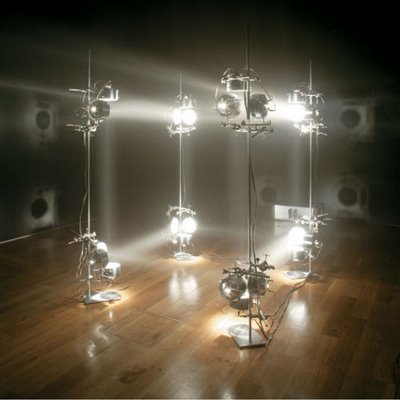A cubic meter of fogged space

[Image: 1M3 Light, 1999, by Olafur Eliasson, described by Metropolis as "a cubic meter of fogged space." From the article: "Using light as others might use bricks and mortar, Eliasson turns luminosity into an architectural element. Often water is the facilitator. He partitions space with curtains made of drops of water frozen by strobe lights... or he converts fog into a building material, neatly carving a cubic meter of emptiness by slicing through a foggy room with spotlights." Photo by Jens Ziehe].
(Earlier: More Eliasson at Four-dimensional films).

Comments are moderated.
If it's not spam, it will appear here shortly!
Olafur Eliasson has a new book available here:
http://www.papress.com/bookpage.tpl?isbn=3037780754&cart=114675387694810
When I saw that article in Metropolis I immediately thought of the moving light installations by Julio Le Parc that I saw in Zurich last summer.
http://www-personal.umich.edu/~numstead/SwissTrip05/Zurich/Zurich_043.jpg
very cool stuff
Sorry, but that link to the new book is actually:
http://www.papress.com/bookpage.tpl?isbn=3037780754
There's an element of design fetishism to the lighting elements that makes them the center of attraction, and not the space that is supposed to me the focal point.
Russell - That Eliasson book looks great; thanks for pointing it out. I saw an Eliasson installation about a year or a year and a half ago here, outside the city, called Your colour memory. It was a floor to ceiling surround-wrapped screen lit from behind by gradually changing colors, each of which radically affected the colors of everything in the room and totally altered the perceived color of natural sunlight coming in through a small window high in the far wall, as if imprinting different colors onto our nervous systems, which then acted as filters. It was pretty cool.
And Numstead, is that you in the picture? Thanks for the image. What exactly was the installation? A machine? Mirrors? Projectors? Robert, I agree; the foregrounded gear of the installation brings as much attention to the set-up as it does to the space that is supposedly framed there in the fog. If it was lasers through dense fog with the light-sources camouflaged that might be a different story; but diffuse fog with heavy stage lights definitely makes this a sculptural piece as much as a spatial experience. Or is that even what you meant? But thanks for the comment!
A bit like a modular / prefab version of the Blur Building ... but you covered that already, right?
Hey oblomov - I haven't actually covered the Blur Building, but I do know about it. But thanks! And this is pretty irrelevant, but I have an ongoing obsession with projecting feature-length films onto abstract screens - in other words, say, Minority Report projected onto moving walls of smoke, without a soundtrack, so you can't actually see what the film is (the images disappear and ripple and fade on the surfaces of fog or smoke). So you do this with enough projectors, on enough walls of smoke, using enough films, and you could build a Blur Building-like/Eliasson-esque architecture made entirely of films... Or some such thing; just an idea. Cinematic structures. Structures made of cinema.
Heck, why not invert the concept altogether? Treat the projected beam of light as the "wall" onto which the motion of the fog is "projected." Since you'd only be see those parts of the image that the fog was moving through, you could project a static image and reveal bits of it by blasting it with fog. Pyrotechnic squibs produce manmade clouds of moving cinema ...
Post a Comment